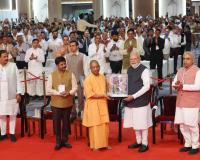Centre has revived Bengal jute industry: Amit Malviya

Malviya, who is co-incharge of West Bengal for the BJP, said that the strategic restrictions on jute imports from Bangladesh have revived confidence among local farmers. Abundant rainfall coupled with visionary policy support has led to better yields, superior fibre quality, and record-high prices of Rs 8,800 per quintal this season, almost double from last year, he pointed out.
“The golden days of jute are back -- thanks to the visionary policies of the Narendra Modi Government,” Malviya remarked. Over 4 million people in Bengal are now benefiting from increased work and on-time payments in the labour-intensive jute sector, he added. Malviya also lauded the efforts of the National Jute Board and Union Minister Giriraj Singh for their relentless efforts in reviving this heritage crop and giving new hope to Bengal’s farmers.
“This is Modi Sarkar’s Atmanirbhar Bharat in action — empowering farmers, strengthening rural livelihoods, and restoring pride to one of Bengal’s most historic crops,” Malviya said. The Indian jute sector plays a critical role in supporting rural livelihoods, especially in West Bengal, which alone accounts for 78 per cent of national production. Raw jute is produced mainly in the state of West Bengal, Bihar, Assam, Orissa, Andhra Pradesh, Tripura and Meghalaya.
It is estimated that that the jute industry provides direct employment to over 4 lakh workers in organized mills and in diversified units including tertiary sector and allied activities, and supports the livelihood of around several lakh farm families. In addition, a large number of persons are engaged in the trade of jute. Nearly 90 perc ent of India’s jute output is consumed domestically, most of which is procured by Government of India. Artificially depressed prices caused by subsidized imports from Bangladesh have had a direct and adverse impact on the income of jute farmers in the past.
The Centre has imposed port restrictions on the import of jute and allied fibre products from Bangladesh to check influx of cheap, subsidised imports from neighbouring country which have depressed prices, hurt farmers’ incomes, and led to underutilised capacity in Indian jute mills leading to closures and unemployment.
The restrictions aim to counter unfair trade practices, promote Atmanirbhar Bharat, and protect rural livelihoods tied to India’s domestic jute economy. The Government is also taking steps to ensure that the imports from Bangladesh are not re-routed through third countries, circumventing the restrictions, according to an official statement.
About The Author
Welcome to Aryan Age, an English newspaper that has been serving readers since 2011 from Delhi. With a loyal circulation of over 19,000, we are dedicated to providing our readers with the latest news and information, as well as insightful analysis and commentary that help them navigate the complex and rapidly changing world.











Comment List